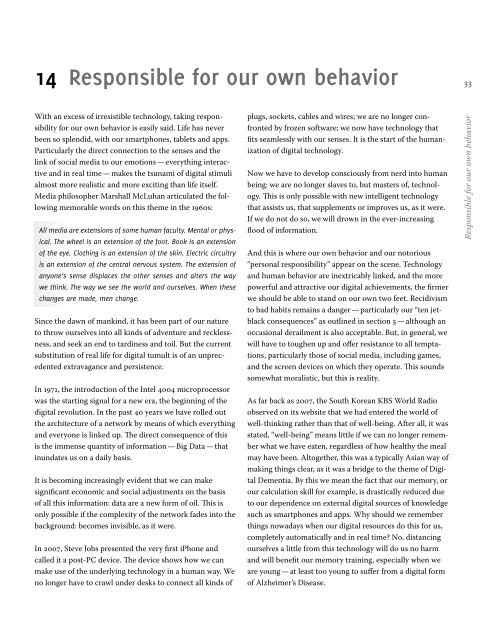VINT-The-Dark-Side-of-Social-Media-Alarm-Bells-Analysis-and-the-Way-Out
VINT-The-Dark-Side-of-Social-Media-Alarm-Bells-Analysis-and-the-Way-Out
VINT-The-Dark-Side-of-Social-Media-Alarm-Bells-Analysis-and-the-Way-Out
You also want an ePaper? Increase the reach of your titles
YUMPU automatically turns print PDFs into web optimized ePapers that Google loves.
14 Responsible for our own behavior<br />
With an excess <strong>of</strong> irresistible technology, taking responsibility<br />
for our own behavior is easily said. Life has never<br />
been so splendid, with our smartphones, tablets <strong>and</strong> apps.<br />
Particularly <strong>the</strong> direct connection to <strong>the</strong> senses <strong>and</strong> <strong>the</strong><br />
link <strong>of</strong> social media to our emotions — everything interactive<br />
<strong>and</strong> in real time — makes <strong>the</strong> tsunami <strong>of</strong> digital stimuli<br />
almost more realistic <strong>and</strong> more exciting than life itself.<br />
<strong>Media</strong> philosopher Marshall McLuhan articulated <strong>the</strong> following<br />
memorable words on this <strong>the</strong>me in <strong>the</strong> 1960s:<br />
All media are extensions <strong>of</strong> some human faculty. Mental or physical.<br />
<strong>The</strong> wheel is an extension <strong>of</strong> <strong>the</strong> foot. Book is an extension<br />
<strong>of</strong> <strong>the</strong> eye. Clothing is an extension <strong>of</strong> <strong>the</strong> skin. Electric circuitry<br />
is an extension <strong>of</strong> <strong>the</strong> central nervous system. <strong>The</strong> extension <strong>of</strong><br />
anyone’s sense displaces <strong>the</strong> o<strong>the</strong>r senses <strong>and</strong> alters <strong>the</strong> way<br />
we think. <strong>The</strong> way we see <strong>the</strong> world <strong>and</strong> ourselves. When <strong>the</strong>se<br />
changes are made, men change.<br />
Since <strong>the</strong> dawn <strong>of</strong> mankind, it has been part <strong>of</strong> our nature<br />
to throw ourselves into all kinds <strong>of</strong> adventure <strong>and</strong> recklessness,<br />
<strong>and</strong> seek an end to tardiness <strong>and</strong> toil. But <strong>the</strong> current<br />
substitution <strong>of</strong> real life for digital tumult is <strong>of</strong> an unprecedented<br />
extravagance <strong>and</strong> persistence.<br />
In 1971, <strong>the</strong> introduction <strong>of</strong> <strong>the</strong> Intel 4004 microprocessor<br />
was <strong>the</strong> starting signal for a new era, <strong>the</strong> beginning <strong>of</strong> <strong>the</strong><br />
digital revolution. In <strong>the</strong> past 40 years we have rolled out<br />
<strong>the</strong> architecture <strong>of</strong> a network by means <strong>of</strong> which everything<br />
<strong>and</strong> everyone is linked up. <strong>The</strong> direct consequence <strong>of</strong> this<br />
is <strong>the</strong> immense quantity <strong>of</strong> information — Big Data — that<br />
inundates us on a daily basis.<br />
It is becoming increasingly evident that we can make<br />
significant economic <strong>and</strong> social adjustments on <strong>the</strong> basis<br />
<strong>of</strong> all this information: data are a new form <strong>of</strong> oil. This is<br />
only possible if <strong>the</strong> complexity <strong>of</strong> <strong>the</strong> network fades into <strong>the</strong><br />
background: becomes invisible, as it were.<br />
In 2007, Steve Jobs presented <strong>the</strong> very first iPhone <strong>and</strong><br />
called it a post-PC device. <strong>The</strong> device shows how we can<br />
make use <strong>of</strong> <strong>the</strong> underlying technology in a human way. We<br />
no longer have to crawl under desks to connect all kinds <strong>of</strong><br />
plugs, sockets, cables <strong>and</strong> wires; we are no longer confronted<br />
by frozen s<strong>of</strong>tware; we now have technology that<br />
fits seamlessly with our senses. It is <strong>the</strong> start <strong>of</strong> <strong>the</strong> humanization<br />
<strong>of</strong> digital technology.<br />
Now we have to develop consciously from nerd into human<br />
being: we are no longer slaves to, but masters <strong>of</strong>, technology.<br />
This is only possible with new intelligent technology<br />
that assists us, that supplements or improves us, as it were.<br />
If we do not do so, we will drown in <strong>the</strong> ever-increasing<br />
flood <strong>of</strong> information.<br />
And this is where our own behavior <strong>and</strong> our notorious<br />
“personal responsibility” appear on <strong>the</strong> scene. Technology<br />
<strong>and</strong> human behavior are inextricably linked, <strong>and</strong> <strong>the</strong> more<br />
powerful <strong>and</strong> attractive our digital achievements, <strong>the</strong> firmer<br />
we should be able to st<strong>and</strong> on our own two feet. Recidivism<br />
to bad habits remains a danger — particularly our “ten jetblack<br />
consequences” as outlined in section 5 — although an<br />
occasional derailment is also acceptable. But, in general, we<br />
will have to toughen up <strong>and</strong> <strong>of</strong>fer resistance to all temptations,<br />
particularly those <strong>of</strong> social media, including games,<br />
<strong>and</strong> <strong>the</strong> screen devices on which <strong>the</strong>y operate. This sounds<br />
somewhat moralistic, but this is reality.<br />
As far back as 2007, <strong>the</strong> South Korean KBS World Radio<br />
observed on its website that we had entered <strong>the</strong> world <strong>of</strong><br />
well-thinking ra<strong>the</strong>r than that <strong>of</strong> well-being. After all, it was<br />
stated, “well-being” means little if we can no longer remember<br />
what we have eaten, regardless <strong>of</strong> how healthy <strong>the</strong> meal<br />
may have been. Altoge<strong>the</strong>r, this was a typically Asian way <strong>of</strong><br />
making things clear, as it was a bridge to <strong>the</strong> <strong>the</strong>me <strong>of</strong> Digital<br />
Dementia. By this we mean <strong>the</strong> fact that our memory, or<br />
our calculation skill for example, is drastically reduced due<br />
to our dependence on external digital sources <strong>of</strong> knowledge<br />
such as smartphones <strong>and</strong> apps. Why should we remember<br />
things nowadays when our digital resources do this for us,<br />
completely automatically <strong>and</strong> in real time? No, distancing<br />
ourselves a little from this technology will do us no harm<br />
<strong>and</strong> will benefit our memory training, especially when we<br />
are young — at least too young to suffer from a digital form<br />
<strong>of</strong> Alzheimer’s Disease.<br />
33<br />
responsible for our own behavior


